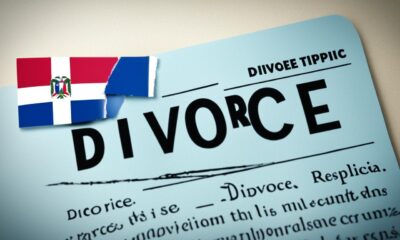Coping Strategies
Navigating Healing: Managing Emotions After Divorce

Were you aware that around 40 to 50% of marriages in the United States conclude with a divorce? Enduring a divorce can be an emotionally taxing and transformative event. It might render individuals feeling swamped, uncertain about how to handle their feelings, and journey through the healing process. Nevertheless, there exist methods and approaches that can aid people in efficiently dealing with their emotions and discovering tranquility post-divorce.
Divorce can trigger a wide range of emotions such as sadness, anger, confusion, and even relief. It is important to recognize and validate these emotions, allowing oneself to grieve and process the end of the marriage. By understanding and managing these emotions, individuals can start to rebuild their lives and move forward on a path of healing.
Key Takeaways:
- Approximately 40 to 50% of marriages end in divorce in the United States.
- Divorce can evoke a variety of emotions, including sadness, anger, and relief.
- Recognizing and validating these emotions is an essential part of the healing process.
- Strategies and techniques can be applied to effectively manage emotions after divorce.
- Moving forward with healing and rebuilding is possible.
Recognizing and Accepting Different Feelings
Going through a divorce is a significant life event that can elicit a range of emotions. It is essential to recognize and acknowledge these feelings as a normal part of the healing process. From sadness to anger, exhaustion to frustration, and confusion to anxiety about the future, divorcing individuals experience a myriad of different emotions. These emotions can be intense and overwhelming, especially when navigating the unfamiliar territory of post-divorce life.
Recognizing and accepting these emotions is crucial for personal growth and healing. By acknowledging the pain and allowing oneself to feel, individuals can begin to process and move forward. It is important to remember that no two divorces are the same, and everyone’s emotional journey will be unique. As time passes, these feelings will gradually lessen, and individuals will find themselves better equipped to handle the challenges that come with moving on.
The Rollercoaster of Emotions
Divorce can unleash a rollercoaster of emotions, ranging from the initial shock and grief to eventual acceptance and hope. The process of untangling a once-intertwined life can be emotionally draining, often leaving individuals feeling overwhelmed and uncertain. However, it’s crucial to remember that these emotions are valid and normal. They serve as signposts in the healing journey and indicators of the deep emotional investment that existed within the marriage.
“Allow yourself to experience your emotions fully. Only by recognizing and acknowledging these feelings can you truly begin to heal.”
Just as a wound must be cleaned and cared for before it can heal, it is essential to allow oneself to fully experience the emotions that arise after divorce. Suppressing or denying these feelings can prolong the healing process. Instead, by acknowledging and embracing the emotions, individuals can take active steps towards understanding their own needs and priorities moving forward.
Recognizing the Unknown
While divorce may offer a sense of relief from an unhealthy marriage, it can also evoke feelings of fear and uncertainty. Venturing into the unknown can be intimidating, even when it’s a step towards a better future. It’s important to remember that these feelings are part of the natural transition process. Accepting the uncertainty and embracing the opportunity for personal growth can bring a renewed sense of self and newfound strength.
Common Emotions After Divorce
| Emotion | Description |
|---|---|
| Sadness | A deep feeling of loss and grief for the end of the marriage. |
| Anger | Feelings of resentment, frustration, and indignation. |
| Exhaustion | Physical and emotional fatigue resulting from the stress of the divorce process. |
| Frustration | A sense of being stuck or overwhelmed with the challenges of divorce. |
| Confusion | Feeling uncertain and disoriented in the face of the new reality. |
| Anxiety | Worry and unease about the future and what it holds. |
Divorce brings a wave of emotions that can be challenging to navigate. Recognizing and accepting different feelings is an essential step towards healing and moving forward. Through self-reflection and allowing oneself to experience the emotions fully, individuals can begin to reclaim their lives and embrace the opportunities that lie ahead.

Giving Yourself Permission to Heal
During the healing process after a divorce, it is crucial to prioritize self-care and grant yourself permission to focus on your own well-being. This period of adjustment can be emotionally challenging, and it is essential to recognize that it’s okay to feel and function at a less than optimal level for a while. Understand that you may not be as productive at work or able to care for others in the same way. Healing takes time, and giving yourself the time and space necessary to heal, regroup, and re-energize is crucial for your overall well-being.
Allowing yourself to take a break and engage in self-care activities is essential for your emotional and mental well-being. Give yourself permission to prioritize your own needs and indulge in activities that bring you joy and comfort. Whether it’s reading a book, taking a walk in nature, practicing meditation, or pampering yourself with a spa day, find what helps you relax and recharge.
Self-Care Ideas:
- Engage in regular exercise to boost endorphins and improve your mood.
- Practice mindfulness and meditation to reduce stress and increase self-awareness.
- Seek professional support through therapy or counseling to navigate your emotions and gain valuable insights.
- Surround yourself with positive influences and spend time with friends and family who uplift and support you.
- Take up a new hobby or revisit old ones that bring you joy and help you rediscover your passions.
Remember, healing is a personal journey, and it’s essential to be patient and kind to yourself throughout the process. It’s okay to have setbacks and challenging moments, but by embracing self-care practices and giving yourself permission to heal, you’re taking an important step towards rebuilding your life and finding happiness and fulfillment once again.
| Benefits of Self-Care After Divorce | Examples of Self-Care |
|---|---|
| 1. Stress Reduction: Self-care activities help lower stress levels and promote relaxation. | 1. Exercise: Engaging in physical activity releases endorphins and reduces stress. |
| 2. Emotional Well-being: Self-care contributes to improved emotional resilience and well-being. | 2. Mindfulness Practice: Practicing mindfulness helps calm the mind and cultivate self-awareness. |
| 3. Improved Physical Health: Taking care of your body can positively impact your overall health. | 3. Creative Outlets: Pursuing creative activities like painting, writing, or playing a musical instrument can be therapeutic. |
| 4. Enhanced Productivity: Investing time in self-care can lead to increased focus and productivity in other areas of life. | 4. Quality Time: Spending quality time with loved ones nurtures relationships and provides emotional support. |

Seeking Support and Connection
Going through a divorce can leave you feeling isolated and overwhelmed. It’s important to remember that you don’t have to go through it alone. Seeking support and connection can make a significant difference in your healing process.
Sharing your feelings with trusted friends and family members can provide a sense of relief and validation. They can offer a listening ear, advice, and empathy during this challenging time. Surrounding yourself with a support system can help ease the burden and make you feel less alone.
In addition to personal connections, joining a support group can be highly beneficial. These groups consist of individuals who are going through or have gone through similar experiences. Connecting with others who understand what you’re going through can be incredibly comforting. It provides a safe space to share your emotions, gain insights, and learn coping strategies from people who can relate to your situation.
By joining a support group, you not only receive emotional support but also access to valuable resources and information. Support groups often provide educational materials, workshops, and guest speakers who address relevant topics related to divorce and healing. These resources can enhance your personal growth and empower you to navigate the challenges more effectively.
Isolating yourself during this period can exacerbate stress levels and hinder your overall well-being, work performance, and relationships. By seeking support and connection, you allow yourself the opportunity to heal and grow with the help of others who have walked a similar path.
Benefits of Joining a Support Group
- Emotional validation: Connecting with individuals who have had similar experiences can validate your emotions and make you feel heard and understood.
- Shared experiences: By sharing your journey, you may discover that others have faced similar challenges and find comfort in knowing you’re not alone.
- Learning and growth: Support groups provide educational resources and insights that can help you gain a deeper understanding of the divorce process and develop effective coping mechanisms.
- New perspectives: Interacting with different individuals can expose you to a variety of perspectives, helping you broaden your understanding and find new ways to approach your situation.
- Building connections: Support groups offer opportunities to build new friendships and connections with individuals who can provide ongoing support and guidance on your healing journey.
| Key Takeaways |
|---|
| Seek support from trusted friends and family members to alleviate the emotional burden. |
| Consider joining a support group to connect with others who have experienced similar challenges. |
| Support groups provide emotional validation, shared experiences, and opportunities for growth. |
| Interacting with different individuals can broaden your perspective and help you find new approaches to healing. |

Taking Care of Yourself Emotionally and Physically
Prioritizing self-care after a divorce is vital for your emotional well-being and overall health. By engaging in activities that promote relaxation and stress reduction, you can nurture yourself during this challenging time. Maintaining your regular routines as much as possible provides a sense of stability and familiarity. It’s important to avoid using substances like alcohol, drugs, or cigarettes as coping mechanisms, as they can worsen your emotional state.
Making conscious efforts to eat well, exercise regularly, and get adequate rest will have a positive impact on your physical and mental well-being. Taking care of yourself emotionally and physically allows you to heal and regain your strength. By investing in self-care, you empower yourself to face the future with resilience and optimism.
Remember, self-care is not selfish. It is an essential part of the healing process and enables you to show up for yourself and others in a healthier and more present way.

The Importance of Self-Care
Self-care is not a luxury but a necessity. It is an act of compassion towards yourself, allowing you to replenish your energy, restore your emotional balance, and maintain your overall well-being.
Self-Care Tips for Emotional and Physical Well-Being After Divorce
- Engage in activities that bring you joy and relaxation: Whether it’s practicing mindfulness, reading a book, taking a walk in nature, or pursuing a hobby, make time for activities that nourish your soul and help you unwind.
- Maintain a routine: Stick to a regular schedule as much as possible. Having structure in your day can provide a sense of stability and control during a time of uncertainty.
- Seek professional help if needed: Consider reaching out to a therapist or counselor who specializes in divorce and can provide support and guidance throughout your healing journey.
- Connect with supportive friends and family: Share your feelings and experiences with trusted loved ones who can provide a listening ear and offer encouragement along the way.
| Benefits of Self-Care after Divorce | Examples |
|---|---|
| Reduces stress and anxiety | Engaging in yoga or meditation |
| Promotes emotional healing | Writing in a journal or practicing art therapy |
| Boosts self-esteem and confidence | Taking up a new exercise or dance class |
| Increase in overall well-being | Getting regular massages or spa treatments |
Remember to be gentle with yourself during this time of healing. Taking care of your emotional and physical well-being is an essential part of the journey towards finding happiness and moving forward after divorce.
Exploring New Interests and Embracing Positivity
After a divorce, it’s crucial to create a fulfilling and joyful life for yourself. One way to do this is by exploring new interests and activities that you genuinely enjoy. Taking the time to pursue your passions can help you rediscover your identity and provide a sense of purpose. Whether it’s trying out a new hobby, taking classes, or volunteering for a cause close to your heart, engaging in these activities can bring a refreshing energy to your life.
Embracing a positive mindset is also essential during this time of transition. It’s normal to feel a mix of emotions, but cultivating a positive outlook can improve your well-being and help you navigate the challenges more effectively. By focusing on the possibilities that lie ahead and believing in your ability to create a fulfilling future, you can approach each day with optimism and resilience.
Benefits of Exploring New Interests
Exploring new interests and activities after divorce can have numerous benefits. Here are some ways it can positively impact your life:
- Rediscovering Yourself: Engaging in new activities allows you to reconnect with your interests and passions, helping you find joy in life again.
- Building Confidence: Trying new things can boost your self-confidence and provide a sense of accomplishment as you master new skills.
- Expanding Your Social Circle: Joining clubs or classes related to your interests can introduce you to like-minded individuals and help you form new friendships.
- Reducing Stress and Anxiety: Engaging in activities you enjoy can provide a healthy outlet for stress and help alleviate anxiety.
- Fostering Personal Growth: Trying new experiences can lead to personal growth and self-discovery, as you challenge yourself and step out of your comfort zone.

Creating a New Family Dynamic
Divorce often brings changes in family dynamics, especially if there are children involved. Embracing new activities, traditions, and routines can help create a positive and supportive environment for everyone. By involving your children in age-appropriate activities and giving them a say in choosing new family traditions, you can help them adjust to the changes and foster a sense of belonging.
| Activity | Description |
|---|---|
| Family Game Night | Designate a specific night each week for playing board games or engaging in friendly competition. This can strengthen family bonds and create lasting memories. |
| Outdoor Adventures | Explore local parks, go on nature walks, or plan camping trips to enjoy quality time together outdoors. |
| Cooking Together | Involve your children in meal planning and preparation. Cooking can be a fun and educational activity that encourages collaboration and creativity. |
| Volunteering as a Family | Select a cause that is meaningful to your family and volunteer together. This can instill values of empathy and compassion while making a positive impact on others. |
Remember, the goal is to create a supportive and loving environment where everyone can grow and thrive, even in the midst of change.
Helping Children Cope and Providing Stability
If you have children, it is crucial to prioritize their well-being and provide the necessary support during the challenging time of divorce. Supporting children after divorce and maintaining stability for kids is of utmost importance, as it can greatly impact their emotional and psychological development. Here are some strategies to consider:
1. Reassure and Listen
Reassure your children that they are loved and that the divorce is not their fault. Create a safe space where they can express their feelings and concerns without judgment. Listening attentively to their thoughts and emotions can help them process the changes and validate their experiences.
2. Maintain Stability and Routine
Children thrive on routine and familiarity. As much as possible, try to maintain a consistent schedule to minimize disruption. This includes keeping regular mealtimes, bedtimes, and other daily activities intact. Predictability and structure can provide a sense of security and stability, helping children feel grounded during this uncertain time.
3. Offer Consistent Discipline
It is essential to establish and enforce consistent rules and boundaries for children after divorce. Consistent discipline helps create a sense of stability in their lives and provides clear expectations for behavior. This consistency can also promote a healthy sense of structure and routine, which contributes to their overall well-being.
4. Avoid Involving Children in Conflict
Shield your children from any conflicts or disagreements that may arise between you and your former spouse. Keep adult issues separate and avoid discussing legal matters, financial disputes, or personal grievances in their presence. Protecting them from unnecessary stress and emotional turmoil can help maintain stability and reduce anxiety.
5. Create a Supportive Environment
Make your home a safe and supportive environment where your children can feel valued, understood, and heard. Encourage open communication and foster positive relationships. Promote healthy coping mechanisms, such as engaging in age-appropriate activities, expressing emotions through art or writing, or seeking support from trusted friends or professionals if needed.

“Children need love, stability, and support to navigate the challenges of post-divorce life. By providing reassurance, maintaining routines, offering consistent discipline, avoiding conflict, and creating a supportive environment, parents can help their children cope and adjust more effectively.
Remember, every child is unique, and their needs may vary. Pay attention to their individual personalities, behaviors, and emotional cues. If necessary, consider seeking professional guidance to ensure the well-being of your children during this transition.
Dealing with Guilt and Moving Forward
Guilt is a common emotion experienced during and after a divorce. It is natural to question decisions made in the past and feel responsible for the breakdown of the marriage. However, it is essential to remember that the end of a marriage does not equate to personal failure. Let go of any perceived mistakes and forgive yourself for any role you may have played in the relationship’s difficulties. Taking accountability for your actions in a healthy way is important for personal growth and moving forward positively.
When faced with decisions during the divorce process, it’s crucial not to let guilt cloud your judgment. Avoid making choices based solely on guilt, as they may not serve your best interests in the long run. Instead, focus on what is fair and reasonable for yourself and any children involved. Seek professional guidance, such as advice from divorce attorneys or counselors, to help you navigate settlement agreements and important decisions with clarity and objectivity.
Working through lingering guilt is an essential part of healing after divorce. Acknowledge your feelings and allow yourself to process them in a healthy way. Journaling, talking to a therapist, or participating in support groups can provide a safe space for expressing and working through your emotions.
“Guilt is often the flip side of love. You can’t have action without consequence.”
Remember that guilt is an emotion and not a permanent state of being. It is a signal that you value the well-being and happiness of yourself and others. Use this awareness to motivate personal growth and make positive changes in your life. Give yourself permission to let go of guilt and replace it with self-compassion and forgiveness.

Focus on moving forward, embracing the opportunities that come your way, and creating a fulfilling life post-divorce. Discover new interests and activities that align with your passions and values. Surround yourself with a support system of friends and family who uplift and encourage you on your journey. By letting go of guilt and embracing your own happiness, you can find the strength to create a future filled with joy and fulfillment.
Conclusion
Managing emotions after divorce is a complex and deeply personal journey. It is completely normal to experience a wide range of emotions, from sadness and anger to relief and even optimism about the future. The key to navigating this process lies in self-awareness, self-care, and seeking support. By recognizing and accepting these emotions, individuals can begin the healing process and forge ahead with renewed hope and resilience.
During this time, it is crucial to prioritize self-care. Giving yourself permission to heal and acknowledging that healing takes time is essential. Take the time to rest, regroup, and recharge both emotionally and physically. Engaging in activities that promote relaxation and stress reduction can play a vital role in restoring balance and well-being.
Additionally, seeking support from trusted friends, family, or a support group can provide immense comfort, understanding, and a sense of shared experiences. Sharing your feelings and thoughts with others who have gone through or are going through a similar situation can be incredibly empowering. Remember, you are not alone in this journey.
Each individual’s healing journey is unique, and it is important to remember that progress may not always be linear. Be patient with yourself, celebrate small victories, and keep moving forward. With time, self-compassion, and the support of others, it is possible to emerge from the challenges of divorce with newfound strength, resilience, and the ability to embrace a brighter future.
It is normal to experience a range of emotions after a divorce, such as sadness, anger, exhaustion, frustration, and confusion. These emotions can be intense and may also be accompanied by anxiety about the future.
The intense emotions you experience after a divorce will lessen over time. It is essential to accept that these reactions are typical and will lessen over time. Healing takes time, and it is important to give yourself permission to feel and function at a less than optimal level for a period. It is important to share your feelings with trusted friends and family members. Consider joining a support group where you can connect with others who are in similar situations. Isolating yourself can hinder your overall health, work performance, and relationships.
Prioritize self-care and take care of your emotional and physical well-being. Engage in activities that you enjoy and that promote relaxation and stress reduction. Maintain your regular routines as much as possible. Make conscious efforts to eat well, exercise, and get adequate rest.
Take time to explore interests and activities that you enjoy independent of your former spouse. Engage in new hobbies, take classes, volunteer, and spend time doing things that bring you joy. Embrace a positive mindset and be flexible in adjusting to new family activities and traditions.
Provide reassurance and listen to their concerns. Maintain stability and routine as much as possible to minimize disruption for them. Offer consistent discipline and avoid involving children in any conflict between you and your former spouse. Create an environment where they feel safe and can rely on you for support.
Remember that the end of a marriage does not equate to failure. Forgive yourself for any perceived mistakes and take accountability when necessary. Avoid making decisions out of guilt and work through any lingering guilt before making settlement agreements. Focus on personal growth and moving forward positively.FAQ
What emotions can I expect to experience after a divorce?
How long will these intense emotions last?
How can I cope with the isolation and stress of going through a divorce?
What are some self-care strategies I can implement to manage my emotions after a divorce?
How can I embrace positivity and move forward after a divorce?
How can I support my children during and after a divorce?
How can I deal with feelings of guilt after a divorce?
Maya brings a wealth of experience in providing emotional support to individuals facing life’s challenges. Her contributions to How Get Divorce are characterized by empathy, understanding, and a profound sense of authority on matters of emotional well-being. Maya’s work is dedicated to ensuring that our community feels supported and understood, offering tools and advice to cope with the emotional aspects of divorce.
Coping Strategies
5 Ways Adult Children Can Cope With Parents' Divorce
Wade through the complexities of navigating your parents' divorce with these five essential coping strategies, and discover how to find stability amidst the storm.

We all know that navigating our parents' divorce can feel like trying to sail through stormy waters without a compass. The choppy emotions and uncertainty can leave us feeling adrift.
However, there are ways to anchor ourselves amidst the turmoil. By setting clear boundaries, seeking professional support, maintaining open communication, finding healthy outlets for stress, and building a strong support network, we can weather this challenging time with resilience and grace.
Let's explore these strategies together and discover how they can help us navigate the storm of our parents' divorce.
Key Takeaways
- Establish emotional boundaries with parents to protect mental well-being.
- Seek therapy for processing emotions and developing coping strategies.
- Maintain open communication with parents to express needs and set boundaries.
- Find personal outlets for stress through activities like exercise and journaling.
Establishing Emotional Boundaries
Establishing emotional boundaries during your parents' divorce is crucial for maintaining your mental well-being and navigating your own feelings effectively. As adult children, it's essential to communicate assertively with your parents about what you can handle emotionally. By setting healthy boundaries, you can protect yourself from being overwhelmed by the details of their divorce. It's okay to express your needs clearly and respectfully, ensuring that you prioritize your mental well-being throughout this challenging time.
When you create emotional boundaries, you give yourself the space to process your own emotions separate from your parents' situation. This allows you to navigate your feelings in a way that's healthy and constructive, without feeling burdened by their divorce. By being assertive about what you can handle and how you wish to be involved, you maintain a sense of autonomy and control over your emotional well-being. Remember, it's important to take care of yourself while supporting your parents through this process.
Seeking Therapy for Support

Therapy offers a safe and supportive environment for adult children to process their emotions and navigate the complexities of their parents' divorce. Seeking therapy can provide a vital outlet for expressing feelings and learning coping strategies to address the emotional challenges that arise.
Professional therapists offer guidance on processing the impact of the divorce, helping adult children develop healthy ways to deal with these effects. Through therapy, individuals can work on establishing boundaries, understanding their emotions, and improving communication post-divorce.
Engaging in therapy sessions can support adult children in building resilience and moving forward positively despite the challenges they face. It's essential to remember that seeking therapy is a proactive step towards healing and growth, offering valuable tools and insights to navigate the aftermath of parental divorce with strength and grace.
Communicating Openly With Parents
When navigating communication with parents post-divorce, fostering open dialogue can be key to expressing emotions and maintaining a healthy relationship. It's essential to communicate openly with our parents while setting boundaries to ensure that our needs are respected. By discussing our concerns calmly and without judgment, we can foster understanding and support within our family unit. Seeking help from friends, family, or professionals when facing communication challenges can provide valuable assistance during this transition. Remember, prioritizing self-care and mental well-being is crucial in these conversations to navigate the challenges that come with parental divorce. Below is a table summarizing key points to consider when communicating with parents post-divorce:
| Key Points |
|---|
| Express feelings openly |
| Set healthy boundaries |
| Seek support |
| Prioritize self-care |
| Communicate calmly |
Finding Personal Outlets for Stress

Navigating the emotions stemming from our parents' divorce can be overwhelming, but finding personal outlets for stress is crucial in maintaining our mental well-being and resilience. When faced with the emotional strain of our parents' divorce, it's essential to prioritize self-care and explore various avenues to alleviate stress. Here are some ways to find personal outlets for stress:
- Engage in stress-relieving activities: Incorporating exercise, meditation, or hobbies into our routine can help manage the emotional turmoil caused by the divorce.
- Seek support: Whether it's from friends, family, or a therapist, reaching out to others can provide a safe space to express our feelings and gain valuable perspectives.
- Journal your thoughts: Writing down our thoughts and emotions can serve as a therapeutic outlet for processing the impact of the divorce and fostering self-reflection.
- Participate in support groups: Connecting with other adult children of divorce in support groups can offer a sense of community and understanding during this challenging time.
Building a Support Network
To establish a strong foundation for coping with parental divorce, building a supportive network of understanding friends and family members is paramount.
When navigating the complexities of our emotions during this challenging time, seeking guidance from a therapist or counselor can provide a safe and non-judgmental space to process our feelings and gain professional support.
Additionally, joining support groups specifically designed for adult children of divorce can offer a sense of community and shared experiences, reminding us that we aren't alone in our journey.
Engaging in self-care activities such as exercise, meditation, or pursuing hobbies can also play a crucial role in promoting emotional well-being and reducing stress levels.
Frequently Asked Questions
How Do Adults Cope With Parents Divorcing?
We cope with parents divorcing by maintaining open communication, setting boundaries, seeking support, addressing concerns calmly, and prioritizing self-care. It's crucial to navigate this challenging time with understanding and care for ourselves.
How Can Adults Help Children Cope With Divorce?
We can support children coping with divorce by encouraging open dialogue, providing love and stability, seeking professional help if needed, maintaining routines, and shielding them from parental conflicts. Our role is crucial in helping them navigate this challenging time.
How Do You Cope With Divorce When You Still Love Him?
When we still love amidst separation, we honor our feelings and seek support to navigate the complex emotions. By setting boundaries, focusing on self-care, and embracing growth, we move forward with grace and resilience.
How Can I Help My Grown Daughter Through Her Divorce?
We can provide emotional support and encourage open communication with our grown daughter during her divorce. By helping her set boundaries, seek professional help if needed, and create a supportive network, we can assist her through this challenging time.
Conclusion
As adult children navigating our parents' divorce, it's important to remember that we aren't alone in this journey. One statistic that may surprise you is that over 1 million children experience their parents' divorce each year.
Let's continue to prioritize our mental well-being, seek support when needed, and remember that it's okay to lean on others during this challenging time. Together, we can navigate this difficult transition with strength and resilience.
Maya brings a wealth of experience in providing emotional support to individuals facing life’s challenges. Her contributions to How Get Divorce are characterized by empathy, understanding, and a profound sense of authority on matters of emotional well-being. Maya’s work is dedicated to ensuring that our community feels supported and understood, offering tools and advice to cope with the emotional aspects of divorce.
Coping Strategies
Coping With Loneliness After Divorce: a Step-By-Step Guide
Kicking off a transformative journey through loneliness after divorce, discover practical steps and self-discovery strategies that lead to healing and a new chapter in life.

Navigating the sea of loneliness post-divorce can feel like being adrift without a compass in uncharted waters.
However, with practical steps and a supportive approach, finding solace and rediscovering oneself is within reach.
As we explore the depths of coping mechanisms and self-discovery in the aftermath of divorce, let's uncover the transformative journey towards healing and embracing a new chapter of life.
Key Takeaways
- Acknowledge and process negative emotions without judgment for healing.
- Engage in social activities to build new connections and combat loneliness.
- Practice self-care and seek professional help for emotional well-being.
- Explore new interests and hobbies to rediscover identity and boost mood.
Understanding Post-Divorce Loneliness
In understanding post-divorce loneliness, it's important to recognize that this emotional experience can vary greatly among individuals. The impact of divorce on our emotional state is profound, and feelings of loneliness can be intensified by emotional abandonment experienced during the marriage.
Coping with post-divorce loneliness involves acknowledging and processing negative emotions without self-judgment. It's normal to feel a range of emotions during this time, and it's crucial to lean on a support system that includes friends and family. Building emotional resilience is key to navigating the challenges of post-divorce loneliness.
While the journey may feel isolating, remember that you aren't alone in this experience. By engaging in healthy coping strategies and surrounding yourself with a supportive network, you can begin to heal from the pain of divorce and gradually rediscover a sense of connection and belonging.
Building Social Connections

Let's strengthen our social connections after divorce by actively engaging in supportive communities and activities. Loneliness can feel overwhelming, but there are ways to combat it. Here are some practical steps to help you build social connections and find companionship during this challenging time:
- Joining Support Groups: Connecting with others who understand your feelings can provide immense comfort and validation.
- Engaging in Social Activities: Participating in events and activities can help you meet new people and form meaningful connections.
- Reconnecting with Old Friends and Family: Reaching out to trusted friends and family members can offer a sense of familiarity and support.
- Volunteering in Community Organizations: Giving back to the community not only reduces loneliness but also gives you a sense of purpose and fulfillment.
- Participating in Online Communities: Engaging in virtual support groups can provide valuable insights, advice, and a sense of belonging in a digital space.
Coping Strategies and Self-Care
Strengthening our coping strategies and prioritizing self-care are crucial steps in navigating the emotional challenges that come with loneliness after divorce. Engaging in self-care practices such as meditation, exercise, or journaling can nurture our emotional well-being, providing a sense of comfort during difficult times. Building a strong support system with friends, family, or support groups is essential in combating feelings of loneliness. Seeking professional help or therapy is a proactive step if these feelings become overwhelming or persistent.
Taking up new hobbies or activities can be a great way to distract ourselves, meet new people, and foster a sense of connection. By practicing gratitude daily and focusing on the positives in our lives, we can promote emotional resilience and well-being. Remember, it's okay to prioritize self-care and seek help when needed; these actions are vital in the journey towards healing and finding peace after a divorce.
Exploring New Interests and Hobbies

Exploring new interests and hobbies post-divorce can open doors to exciting opportunities for personal growth and fulfillment. It's a chance to shift your focus from the past to the present, embracing activities that bring joy and a sense of purpose. Here are some ways diving into new hobbies can benefit you:
- Find Fulfillment: Engaging in activities that you enjoy can provide a sense of fulfillment and accomplishment.
- Boost Your Mood: Trying new things can boost your mood and overall well-being, helping you navigate through challenging times.
- Create a Fresh Identity: Discovering new interests allows you to create a fresh identity and explore different aspects of yourself beyond your past relationship.
- Expand Your Social Circle: Exploring new hobbies can introduce you to like-minded individuals, expanding your social circle and providing a sense of community.
- Explore Yourself: Trying out new interests is a great way to explore different facets of your personality and interests, leading to personal growth and self-discovery.
Seeking Support and Community
Navigating the challenges of loneliness after a divorce can be eased by actively seeking out support and community resources. Joining a support group can provide a sense of belonging and understanding from individuals who are going through similar experiences. Additionally, seeking therapy or counseling post-divorce can offer professional guidance in coping with loneliness, helping you navigate your emotions more effectively.
Engaging in social activities and events is another effective way to combat feelings of isolation and build new connections. Building a strong support system with friends and family members can offer valuable emotional support and companionship during tough times. Participating in volunteer work or community service can also provide a sense of purpose and connection to others, reducing feelings of loneliness by allowing you to contribute positively to society.
Frequently Asked Questions
How Can I Manage Feelings of Guilt or Shame After My Divorce?
We manage feelings of guilt or shame after divorce by acknowledging our emotions, seeking support from loved ones or therapy, and focusing on self-compassion and growth. It's okay to feel this way; we're not alone.
Is It Common to Experience a Sense of Loss Over the End of My Marriage, Even if I Initiated the Divorce?
Absolutely, it's entirely normal to feel a sense of sorrow or separation after divorce, even if you initiated it. We, too, experienced this. Processing these emotions with care and support is crucial for healing.
What Are Some Ways to Navigate Awkward Social Situations or Interactions With Mutual Friends Post-Divorce?
Navigating awkward social situations post-divorce can be tough. We find that honesty, setting boundaries, and focusing on our well-being help. It's about being true to ourselves and surrounding ourselves with understanding friends.
How Can I Address Any Negative Self-Talk or Beliefs About Myself That May Have Developed During or After the Divorce?
Feeling down about ourselves post-divorce is common. We've been there. It's crucial to challenge those negative beliefs. Treat yourself as a dear friend, offering love and encouragement. Embrace your worth; you deserve it.
Are There Any Specific Resources or Support Groups Tailored to Individuals Going Through a Divorce Who Are Also Dealing With Loneliness?
Of course, there are tailored resources and support groups to help individuals navigating divorce and loneliness. These can provide comfort, understanding, and practical advice. Connecting with others in similar situations can make a significant difference in your journey.
Conclusion
As we navigate the challenging waters of post-divorce loneliness, let's remember that this feeling is temporary. By prioritizing self-care, building social connections, exploring new hobbies, and seeking support, we can gradually find our way to a fulfilling and happy life beyond divorce.
Remember, the journey may be tough, but with perseverance and support, we can emerge stronger and more resilient than ever before. Trust in the process and believe in your ability to overcome this obstacle.
Maya brings a wealth of experience in providing emotional support to individuals facing life’s challenges. Her contributions to How Get Divorce are characterized by empathy, understanding, and a profound sense of authority on matters of emotional well-being. Maya’s work is dedicated to ensuring that our community feels supported and understood, offering tools and advice to cope with the emotional aspects of divorce.
Coping Strategies
7 Ways Men Can Cope With Divorce
Journey through seven essential strategies for men to navigate the challenges of divorce and emerge stronger than ever.

As we journey through the turbulent seas of divorce, we frequently search for methods to stabilize our emotional health in the midst of chaos.
However, with careful consideration and strategic planning, there are seven key strategies that can help men not only survive but thrive post-divorce.
From redefining personal goals to fostering a strong support system, these coping mechanisms offer a roadmap to healing and growth in the aftermath of a significant life transition.
Key Takeaways
- Embrace change as a path to personal growth.
- Build a strong support system for emotional stability.
- Prioritize self-care and well-being during the transition.
- Seek professional counseling for guidance and coping strategies.
Acceptance and Embracing Change
Embracing the reality of divorce and welcoming change is a crucial step for us men to begin our journey towards healing and moving forward. Acceptance is the first key to unlocking the door to personal growth post-divorce. It's about acknowledging the situation for what it is, not what we hoped it would be.
By embracing change, we allow ourselves the opportunity to redefine who we're and what we want out of life. This can be a chance for us to shed old layers and embrace new beginnings.
During this healing process, uncertainties and emotional challenges may arise. It's important to remember that change is inevitable post-divorce. By understanding this, we can navigate the emotional rollercoaster with more grace and resilience.
Letting go of the past doesn't mean forgetting it; it means accepting it and choosing to move forward. Embracing new beginnings isn't always easy, but it's a necessary step towards finding peace and happiness once again.
Building a Strong Support System

Establishing a strong support system is crucial for men navigating the challenges of divorce, providing a foundation of stability and comfort during this difficult period. When coping with the emotional turmoil of divorce, having a network of supportive individuals can make a significant difference in how we navigate this challenging time.
Here are four ways to build a strong support system:
- Lean on Friends and Family: Reach out to trusted friends and family members who can lend a listening ear and offer support during this challenging period.
- Consider Therapy or Support Groups: Joining therapy sessions or support groups can provide a safe space to express your feelings and gain insights from others going through similar experiences.
- Seek Professional Help: Consulting with therapists or counselors can equip you with valuable coping mechanisms to navigate the complexities of divorce.
- Build Trustworthy Connections: Cultivate relationships with individuals you trust, creating a support network that helps combat feelings of isolation and empowers you to face the challenges ahead.
Prioritizing Self-Care and Well-Being
As we focus on prioritizing self-care and well-being after divorce, it's essential to recognize the value of nurturing our mental and physical health during this challenging time. Engaging in self-care activities like exercise, mindfulness, and healthy eating can significantly improve our overall well-being. By taking care of ourselves, we can better cope with the emotional stress of divorce and rebuild our confidence and sense of identity.
Let's explore some practical ways to prioritize self-care and well-being:
| Self-Care Activities | Benefits | Tips for Implementation |
|---|---|---|
| Benefits of Professional Help | ||
| Reduces risk of mental health issues like depression and anxiety | ||
| Tailored coping strategies for individual needs | ||
| Safe space to express emotions and work towards healing | ||
Engaging in therapy is a proactive approach towards enhancing mental well-being and personal growth during the divorce journey. Remember, seeking help is a sign of strength and self-care.
Building a Support System
To navigate the challenges of divorce effectively, men can start by actively building a support system that promotes positive coping mechanisms and emotional stability. It's crucial to surround yourself with understanding individuals who can offer encouragement and guidance during this difficult time. Here are four ways to cultivate a strong support system:
- Engage with friends, family, or support groups: Create a safe space to share your feelings and experiences.
- Seek professional therapy or counseling: Process your emotions and navigate divorce challenges effectively.
- Participate in physical activities or hobbies: Healthy outlets for stress can promote mental well-being.
- Create a support network: Receive the encouragement and understanding needed for successful divorce recovery.
Focusing on Future Growth and Healing

As we navigate through the challenges of divorce, focusing on future growth and healing becomes a crucial aspect of our journey towards a brighter tomorrow. It's essential to embrace personal growth by redefining ourselves through new habits and cultivating positive outlooks. Breaking free from old patterns facilitates healing and helps us move forward in life post-divorce. Engaging in classes and social groups allows us to step out of our comfort zones, embracing change and new experiences as part of our healing process. Taking proactive steps towards personal growth is key to transitioning positively after divorce.
| Future Growth and Healing | Practical Tips |
|---|---|
| Embrace Personal Growth | Redefine yourself through new habits and positive outlooks. |
| Moving Forward Post-Divorce | Break free from old patterns to facilitate healing and progress. |
| Embracing Change | Engage in classes and social groups to step out of your comfort zone. |
| Healing Process | Take proactive steps towards personal growth and transitioning post-divorce. |
Frequently Asked Questions
How Does a Man Cope With Divorce?
We understand how overwhelming divorce can feel. Seeking therapy, staying active, building a support network, prioritizing self-care, and focusing on healthy co-parenting are essential. Remember, you're not alone, and we're here to help.
What Divorce Does to a Man Emotionally?
Divorce can leave us feeling emotionally shattered. It triggers a whirlwind of fear, anxiety, and depression. We struggle with vulnerability and the weight of drained spirits. Coping with these deep wounds takes time and support.
Why Is Divorce so Hard on Men?
Divorce hits us hard as we navigate through loss, shattered dreams, and identity crises. Coping with the emotional turmoil, societal pressures, and uncertainties, we struggle to find our footing amidst the storm.
How Do You Cope With Divorce When You Still Love Him?
We cope with divorce when we still love him by prioritizing our emotional well-being, seeking therapy for clarity, focusing on self-care, setting boundaries, and allowing ourselves to grieve while working towards healing and acceptance.
Conclusion
As we navigate through the challenging journey of divorce, let's remember that healing takes time and patience.
By embracing change, building a strong support system, and prioritizing self-care, we can gradually find peace and growth.
Let's continue to focus on our well-being and future, knowing that each step we take brings us closer to a brighter tomorrow.
Stay strong, stay hopeful, and remember that better days are ahead.
Maya brings a wealth of experience in providing emotional support to individuals facing life’s challenges. Her contributions to How Get Divorce are characterized by empathy, understanding, and a profound sense of authority on matters of emotional well-being. Maya’s work is dedicated to ensuring that our community feels supported and understood, offering tools and advice to cope with the emotional aspects of divorce.
-

 Life After Divorce2 months ago
Life After Divorce2 months agoTD Jakes: Life After Divorce – A Journey of Healing
-

 Navigating the Divorce Process2 months ago
Navigating the Divorce Process2 months agoNavigating the Complexity: Divorce Document Preparation Services Explained
-

 Financial Aspects2 months ago
Financial Aspects2 months agoFinancial Advisor's Guide to Navigating Divorce Finances
-

 Supporting Children Through Divorce2 months ago
Supporting Children Through Divorce2 months agoPositive Effects of Divorce on Children: A Guide to Understanding
-

 Navigating the Divorce Process2 months ago
Navigating the Divorce Process2 months agoDivorce Lawyers New Orleans: Your Ultimate Guide to Legal Separation and Family Law
-

 Navigating the Divorce Process2 months ago
Navigating the Divorce Process2 months agoNavigating Divorce with a Muslim Divorce Lawyer
-

 Navigating the Divorce Process2 months ago
Navigating the Divorce Process2 months agoUnderstanding Dominican Republic Divorce Law
-

 Directory2 months ago
Directory2 months agoCompassionate Vista Divorce Attorney | Family Law Help








































